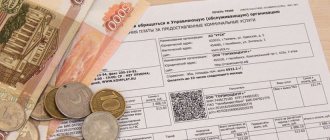When do you need to pay utility bills?
The method chosen to pay for services in the housing and communal services sector affects the time at which funds are credited to the account with the resource supply company.
As a result, the homeowner deposits money within the established time frame, although the deposit date will be later.
The citizen will have to pay penalties for several days of delay . For this reason, it is recommended that you fund your account a few days before the end of the payment period.
Important! The payment can be considered executed only if funds have been credited.
The legislative framework
According to Article 40 of the Constitution of the Russian Federation, every citizen is guaranteed the legal right to residential premises suitable for living.
At the same time, not every family in the country has its own living space or the funds to purchase it. Therefore, at the state level, various programs are provided to make housing more affordable, as well as slightly reduce the cost of maintaining it for some categories of beneficiaries.
It does not matter how the apartment was purchased or obtained, the residents in any case have the obligation to pay bills for the resources used. At a minimum, we are talking about gas, electricity, water, drainage and so on.
According to Article 153 of the Housing Code of the Russian Federation, the following are required to pay utility bills:
- owners of residential apartments;
- employers of social apartments;
- persons renting an apartment and paying rent;
- relatives of the homeowner, if for some reason he is absent at the time of payment.
As for housing services, owners must pay for them in accordance with the standards established in the region of their residence, with meter data and Government Decree number 354.
Terms and methods of payment for housing and communal services
The deadlines for payment of utility bills according to the Housing Code must be taken into account when depositing money into the account.
Article 155 of the Housing Code of the Russian Federation indicates that by the 10th day of the month following the payment period, the amounts must be received by the housing and communal services.
The following options for depositing funds into the account can be used:
- using bank cards;
- through cash;
- from electronic wallets.
Currently, a common method of payment is to contact the cash desk of a banking organization. Similar services are provided by many banks. It is stipulated that additional interest will be paid for using this option.
Each bank sets its own rates. To perform this operation, you need to have a receipt in hand. The main disadvantage of this method is that the appeal can only occur during the working day. In addition, the negative point is the presence of queues.
Important! Funds are credited to your account within 3 business days. For this reason, you need to take care of depositing money.
Other payment methods and terms for receipt of funds to the housing and communal services account
Another common method of payment is using an ATM. To do this, you need to have a plastic card issued by a banking organization. The option requires paying a commission.
However, the amount is less than in the option of going to the bank cash desk. To deposit funds you need to use a personal account, which consists of 10 digits. The deadline for payment of utility bills in this case should be 3-5 working days before the period established by law.
Making payments via mail, Internet banking
The ATM does not give out change, so the remaining money is automatically transferred to the next month. If a citizen is a client of the Bank of Moscow or Sberbank, it is most profitable for him to deposit funds when contacting the post office . There is no commission for cardholders of these banks.
a mobile phone account can be used . In addition, it is possible to carry out the transaction through Internet banking . The main condition is the presence of a connection to the Mobile Bank system. You need to enter your personal account information.
Important! To avoid delays in payment, you need to deposit funds only on business days.
Another option is the State Services portal. In this case, registration on the site is required. In all of the above situations, the approximate time frame for crediting funds is 3-5 days.
Do I need to keep receipts after payment?
When talking about the deadline for paying utility bills, you need to take into account that after depositing funds, checks should be kept . The law does not stipulate how long receipts must be retained.
However, the limitation period is fixed. It is 3 years. The countdown starts from the moment of payment.
During this period, an organization providing services in the housing and communal services sector may make demands for forced payment of the debt. If the person does not have receipts confirming the deposit of money, he will have to deposit the funds again . For these reasons, it is required to keep checks for a specified period. Otherwise, you will not be able to prove that you are right.
Also the provisions of Art. 199 of the Civil Code of the Russian Federation reflect that outside the limitation period, a statement of claim can still be filed. Then the citizen, referring to the checks, can challenge the possibility of sending such a document.
Penalties for failure to comply with payment deadlines for housing and communal services
All residential owners must clearly understand when to pay utility bills and what consequences are provided in case of delay. They are expressed in the suspension of the supply of housing and communal services . This measure is used when there is a delay of 3 months in a row.
When an independent connection to housing and communal services systems takes place, penalties . Its value is 10,000 - 15,000 rubles. If payment is not made for a longer period, the case is referred to the judicial authority.
Accrual of late fees
The provisions of paragraph 14 of Art. 155 of the Housing Code of the Russian Federation establishes the amount of penalties accrued when a payment period is missed. The size of the sanction is 1/300 of the refinancing rate established by the Central Bank of the Russian Federation.
This amount is additionally added to the amount of debt every day that the payment is overdue. When the debt is established for more than 91 days, the rate increases to 1/130.
Please note: for this reason, bills must be paid within the specified time frame every month. It is necessary to take into account the periods of crediting funds.
Limitation periods for paying utility bills
The statute of limitations should be understood as the period during which an organization providing services in the field of housing and communal services has the right to file an application for debt collection . The rule applies to appeals to judicial authorities.
The provisions of Art. 196 of the Civil Code of the Russian Federation. This provision stipulates that the statute of limitations for the category of cases under consideration is 3 years .
This means that the resource supply company has the right to make claims only within this period. If a citizen refuses to participate in such a process, he is automatically subject to the obligation to make payment.
Practical advice
Who should pay for the purchase and sale agreement?
In order to correctly understand what you have to pay money for, it is recommended to study the breakdown of indicators that are indicated in payment documents.
Formulas and abbreviations
The receipt uses a large number of abbreviations and formulas, and not all of them are understandable to ordinary consumers:
| Reduction | Decoding |
| PU number | This abbreviation indicates the numbers of measuring instruments in the room. |
| Pl. O/F | The size of the area and its division into residential and non-residential. |
| Register/stay | This abbreviation denotes the number of registered residents and the number actually living in a given premises. |
| General House area | This abbreviation refers to the area of all premises of a given house. This includes both residential and non-residential premises. |
| ONE | Payment for general house needs |
| Contents | The amount accrued for the maintenance of housing stock. |
| IPU | Individual metering device |
| ITU | Individual metering point |
| ODPU | Household metering device |
| KTU | Collective metering point for apartment buildings. |
| MOP | Common areas. |
All amounts are calculated based on meter readings using formulas. For example, if water supply is paid according to meter readings. The payment amount (in the formula it will be designated Vsnab) consists of the volume of consumption according to the meter (Vв) and the tariff per cubic meter established by the local Administration. Thus, the formula for calculating the payment for water will look like this: Vsnab = Vb * Tariff.
Decoding paper
When paying for utilities, it is best to carefully study the receipt first. The upper right corner should contain all the data about the apartment. The number of people living should be specified here; this value is needed to calculate water consumption standards if meters are not installed in the premises.
An important point is the total area, as it is important when calculating the amount for general house needs and heating.
When paying, please note that the payment for water supply is divided into hot and cold water consumption. These two indicators are represented in two lines
In addition, there is a drainage point. This is a payment for sewer maintenance.
Sample Filling
When filling out the sample, you must take certain points into account:
- if the billing period is not indicated on the payment slip, then you need to enter it manually;
- corrections in the document should not be allowed;
- opposite each service the amount of payment by the payer must be indicated;
- It is mandatory to fill in the total amount column;
- the amount paid is entered in the paid column;
- The receipt must be dated and signed at the end.
If the form is filled out incorrectly, it may not be accepted for payment. And the document will have to be drawn up again.
Payment terms for housing and communal services in the capital
The provisions of Moscow Law No. 2 of 2010 “Fundamentals of the housing policy of the city of Moscow” indicate that the deadlines for payment of housing and communal services are set no later than the 10th day of the period that follows the reporting period.
A reservation is made that other time frames may be specified in the agreement between the citizen who has the rights of ownership of residential premises and the organization providing services in the field of housing and communal services.
In fact, the deadline for paying utility bills in Moscow is set by service providers within the 25-30th of each month . This period is needed so that housing and communal services organizations can generate receipts for payment, and citizens can deposit funds.
Payment terms for other regions are shown in the table:
| Subject | Period |
| Altai region | No later than the 30th |
| The Republic of Buryatia | No later than 3-5 |
| Volgograd region | No later than the 10th |
| Ivanovo region | No later than the 25th |
| Leningrad region | No later than the 10th |
| Novosibirsk region | No later than 27-30 |
| Omsk region | No later than the 10th |
| Tver region | No later than the 30th |
| Ulyanovsk region | No later than the 5th |
| Yakutia (Sakha) | No later than the 10th |
In each specific case, you need to find out the deadlines from the organization providing services in the housing and communal services sector.
EPD in questions and answers: how to receive, read and pay
Muscovites have been receiving a single payment document for more than 10 years.
Since then, it has managed to change in appearance, and is increasingly being ordered and paid for electronically. Mos.ru reminds you what payment cards should look like and what the information on them means. EPD is a single payment document. It is received by residents whose houses are calculated by the public services center. From January 2021, Muscovites receive a single payment document in A4+ size (228 by 450 millimeters). The document is sent without an envelope, but folded and sealed at the edges, with a colored block of socially significant information, uniform for the entire city.
What does this or that column on the payment slip mean?
At the top of the document there is an information block for transmitting readings from individual water meters. It indicates the payer code, last name, first name, patronymic and residential address, as well as previous meter readings.
On the receipt itself, the last name, first name and patronymic of the owner or responsible tenant are printed at the top left, below is the address, and below it is a barcode.
Opposite the last name are the month and year for which the payment was generated, next to the address is the payer’s personal code (10-digit combination of numbers).
This code is needed when paying for housing and communal services at terminals, ATMs or via the Internet. Under the fields with the amount and space for signature and date of completion, the name, address and details of the management organization are printed. Below is a detailed invoice, which indicates consumption volumes, tariffs, amounts, benefits and recalculation for each service.
This includes hot and cold water supply, drainage, heating of the main area, voluntary insurance, major repairs, radio, locking device, antenna, maintenance and repair of residential premises.
Features of payment terms for housing and communal services
The basis for payment may be a notification in either paper or electronic format. Therefore, deposits often occur earlier than the deadlines stipulated by the resource supply company.
To do this, information about the amounts must be posted on the supplier’s official website. Payment is made for the past period during which the services were used by housing and communal services.
Thus, payment for services in the housing and communal services sector should be done within a strictly specified time frame. Otherwise, sanctions will be applied to the citizen who is the owner of the residential premises. They are presented in the form of fines and service shutdowns.
Rights and obligations of suppliers and consumers
The rules in question fully explain the rights and obligations of organizations acting as direct suppliers of utility services.
Among the main obligations of the performers, the following should be highlighted:
- the supplier is obliged to provide housing and communal services for the benefit of the population to the extent that it needs;
- the quality of services must necessarily comply with the standards adopted in the state;
- all claims made by consumers must be recorded in a special journal after sending written notice to a specific address;
- Regular checks of the quality of services provided are mandatory - the results of relevant activities are recorded in a separate document and submitted to the head of the organization for signature and seal;
- timely conclusion of agreements with interested categories of persons;
- notification to consumers in the event of a planned interruption in the supply of energy resources.
As for the rights and responsibilities of consumers, they are as follows:
- careful operation of all communications laid through the residential premises;
- organizing timely access for utility employees to check engineering systems and individual metering devices;
- immediate notification of service company employees about the emergency condition of devices or the building as a whole;
- admission of the emergency response team to the scene of the incident;
- timely payment for services received - fines and penalties are imposed on citizens for long-term delays in payments.
Is it possible to challenge a court order for utility payments? Read this article.
Reasons for transferring money
Payment for the maintenance of premises and the supply of utility services is carried out on the basis of special receipts, which, in turn, can be generated in electronic format.
Payment is also made based on information about the tariff rate for a specific residential premises, the presence of debt obligations for utilities, the installed reading systems, and so on.









